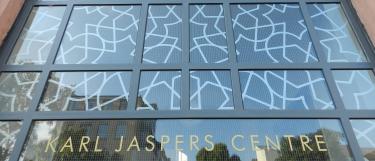
Centre
The Heidelberg Centre for Transcultural Studies was founded in 2013 as host to the Cluster of Excellence “Asia and Europe in a Global Context: The Dynamics of Transculturality”. Since the end of the Cluster Asia and Europe in 2019, the HCTS has continued to foster research and teaching with a transcultural agenda.
The HCTS is located in the Karl Jaspers Centre for Advanced Transcultural Studies on Campus Bergheim, next to the Centre for East Asian Studies, the Institute of Anthropology, and the South Asia Institute, with whom it forms the Centre for Asian and Transcultural Studies. It is named after Karl Jaspers (1883-1969), a German philosopher and psychiatrist, who studied and taught at Heidelberg University. Originally trained in medicine his interest covered many disciplines such as psychology, psychiatry, and philosophy. He became professor at the Department of Philosophy in Heidelberg in the 1920s. After World War II he emigrated to Switzerland.
Departments
The HCTS hosts the five departments of Buddhist Studies, Cultural Economic History, Global Art History, Intellectual History, and Visual and Media Anthropology. Two further departments, Medieval History (Center for European History and Cultural Studies) and Chinese Cultural Studies (Center for East Asian Studies), are associated.

Organization
The centre is lead by a board of directors, and its daily business is taken care of by its administrative team. The HCTS receives regular advice from its Academic Advisory Board.